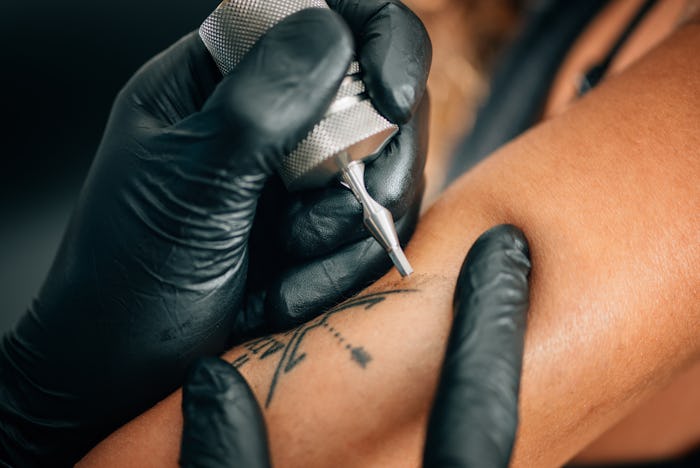Life

7 Things A Tattoo Artist Wants You To Know About Why They Cost So Much
If you've priced tattoos in the past few years, then you know that plenty of shops and artists do not come cheap. So why did that tiny circle on your wrist cost over $100? By learning more about the things a tattoo artist wants you to know about cost, you'll have a much better idea of why tattoos tend to come with certain prices. There's a lot more to it than a little bit of ink and some needles.
When you factor in the many little costs of tattooing, as well as the number of years it takes to become proficient in the art, then the prices start to make a lot more sense. A tattoo isn’t some mass-produced thing you can order online; instead, it’s a custom piece of art designed to fit your specific body. Plus, it always makes sense to pay the person who’s controlling the needle.
To learn more, Romper spoke with Tabby Farrar of Just Can't Settle, a former tattoo shop receptionist and generally heavily tattooed person with a lot of friends in the industry. With Farrar’s thoughts, as well as some insight from artists in the industry, it’s much easier to understand why tattoos cost what they do.
1Skill Level
It can take years of practice to become a proficient tattoo artist. "The price of tattoos varies wildly because every artist sets their hourly rate according to their experience, or perceived level of skill," says Farrar. "Someone who has been tattooing for a decade will typically cost more than someone who just started out, in the same way that the head stylist at a hair salon will cost more than the junior stylist." And for the most part, it does make sense to pay a little more for someone with that level of experience.
2Overall Time
In general, a great tattoo should not be a rush job, so keep this in mind for artists who charge hourly. "I know that when I charge hourly rates for a tattoo it's because maybe it's a big piece or I don't know exactly how long it's going to take," said tattoo artist & YouTuber Holly Astral. "When you're doing bigger and bigger pieces, you can guarantee with less and less certainty exactly how long it's going to take to do it." For the most part, the artist is only trying to make sure you get a quality piece, so it's OK to pay for an extra hour or more if necessary. The last thing you want is to rush something that's supposed to stay on your body forever.
3Prep Work
The artist also does a lot of work before you even step in the shop to get your piece done. "The cost takes into account not just the hours of time you get tattooed, but the hours of drawing ahead of the session," explains Farrar. Plus, there's the added complication of creating a sketch on paper that will translate well to a person's body. A proficient tattooist definitely earns that label of artist.
4Placement
Some areas of the body are simply more difficult to tattoo than others. "According to the tattoo artists, there are more sensitive and least sensitive areas where the tattoo can be inked," as stated in Tattoo Journal. "The least sensitive areas are relatively cheap." More sensitive areas may be trickier for the artist (and the person getting tattooed) to handle, and therefore command a higher price.
5Equipment Costs
Tattooing is not a cheap art. The cost of needles, inks, and other equipment is also added to the price of a tattoo, explains Farrar. As with anything else, quality equipment tends to cost a bit more.
6Cost Of Shop Rent
Don't forget about rent. "It is also worth noting that the cost of shop rent varies from place to place, along with the tattoo artist's everyday living expenses," says Farrar. In fact, "most artists will pay at least 30 percent of their fee to the studio they work at — again in the same way as a hairdresser or beautician who rents a chair within a salon and pays to be there." It isn't like your artist just gets to pocket everything you pay.
7Popularity
It's a simple case of supply and demand. Artists that are already popular can charge higher prices and still get work, so you may pay a premium to work with them, as explained in Authority Tattoo. Tattooing is definitely an art form, but it's also a business like any other. That explains why quality tattoos can be so expensive, but ultimately worth the cost.